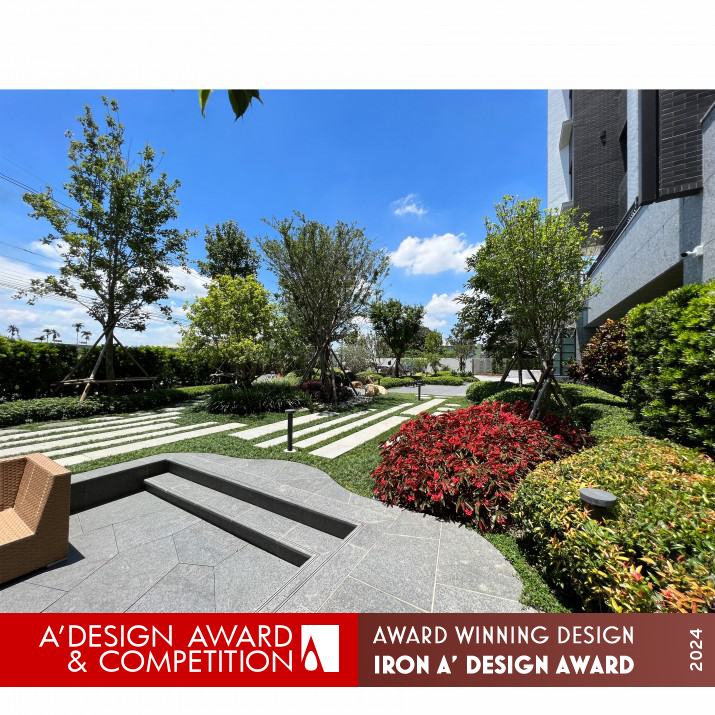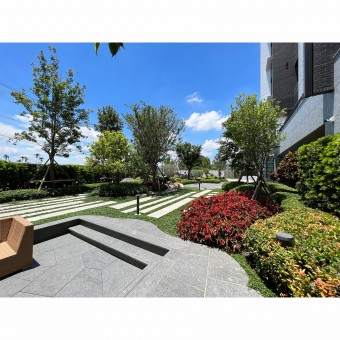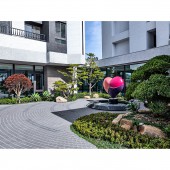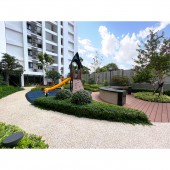|
|
|


|
|
| DESIGN DETAILS |
DESIGN NAME:
Field Garden
PRIMARY FUNCTION:
Landscape Renovation
INSPIRATION:
With the rapid urban expansion, the urbanization of cities has expanded to the rural areas. The original fruit farm in the same location has been abandoned and the farming activities has stopped for a long time, leaving a lot of withered fruit trees and exposed soil on site. The environmental conditions were deteriorating day by day, posing a challenge to the current project, which aims to create a symbiotic and integrated relationship between people and the agricultural ecological environment in this garden.
UNIQUE PROPERTIES / PROJECT DESCRIPTION:
Two of the 60-year-old Litchi chinensis were preserved and relocated to the main entrance of the abandoned fruit farm, serving as a symbolic representation of the new space. The original farmland was transformed into a community garden, providing leisure and recreational activities to the community in the nearby neighborhood. In the garden, a rainwater recycling system was incorporated and an space was especially designed for children to observe the ecology and the food forest.
OPERATION / FLOW / INTERACTION:
Based on the theme of the adventures of Dorothy and her three friends (the Lion, the Tin Man, and the Scarecrow) in the fairy tale "The Wizard of Oz," the design transforms the field spaces into an environment that is both functional and enjoyable. The design concepts, which are inspired by the themes of the encounters in the forest the explorations in the forests, aim to encompasses elements of spiritual healing, courage, and physical strength. Ultimately, it aims to create a joyful and welcoming space. The design incorporates a small edible forest and an area for sports and recreational activities. This space encourages the interaction between parents and children in the neighborhood by integrating fun games in the playground and facilitating daily communication in the community.
PROJECT DURATION AND LOCATION:
The project began in January 2021 in Mt. DaDu in Taichung City, Taiwan, and was successfully completed in February 2023.
|
PRODUCTION / REALIZATION TECHNOLOGY:
After conducting environmental simulation analysis using Envi-met for the existing natural factors such as climate, wind patterns, and sunlight at the site, the designer introduced suitable native vegetation to the local environment. Apart from creating comfortable activity spaces, the design also incorporates terrain variations to mitigate noise, retain rainwater, and provide protection against strong winter winds.
SPECIFICATIONS / TECHNICAL PROPERTIES:
Design area: 2,045 square meters
TAGS:
edible garden, community garden, agricultural landscape, agricultural natural ecology
RESEARCH ABSTRACT:
The diverse and native vegetation cultivates an ecological habitat brimming with vitality, promoting a friendly environment for biodiversity. The application of large amount of greenery establishes connections among the belt-shape agricultural area in the surroundings, creating the comprehensive habitats by fostering increased migration and habitat opportunities for various animals and living creatures. As a result, the overall biodiversity of the agricultural areas can be greatly improved.
CHALLENGE:
The utilization of vegetation serves to ameliorate the harsh climate in winter and establish a pleasant outdoor microclimate, effectively mitigating the heat island effect in the city within this area. In addition, reducing the size of the developed area preserves significant portions of prime land, allowing rainwater to naturally infiltrate through the original soil. Furthermore, the implementation of small underground reservoirs ensures the continuous water conservation during the drought period, resulting from the insufficient rainfall in winter.
ADDED DATE:
2023-06-29 10:57:21
TEAM MEMBERS (1) :
IMAGE CREDITS:
IMAGE CREDITS:
Millet Design Co., Ltd.
Jeou Tarng Estate Co., Ltd.
|
| Visit the following page to learn more: https://www.mildg.com/ |
|
| CLIENT/STUDIO/BRAND DETAILS |
 |
NAME:
Millet Design Co., Ltd
PROFILE:
Millet Design was founded in 2003 during the booming period of the real estate industry in Taiwan. Millet Design believes that the power of “nature” can address and enhance the deteriorating living environment caused by extreme climates. Therefore, the company chose “landscape design” as its starting point and align its core concept with the principles of nature. With over 20 years of experience in residential environment design, we have consistently created pleasant and comfortable living spaces, significantly improving the quality of residential public landscapes. The nature-based design has always been the core principle of our company. In recent years, our design goals also focused on restoring the ecological environment, reducing carbon emissions, and creating comfortable and healthy living environments. Millet Design offers a comprehensive range of services, with a team of approximately 30 designers and construction experts. Our services include the design and construction of landscape architecture of residential housing or factory, hotel interior design, architectural exterior design, and other design projects. By offering the professional landscape design services for more than 20 years, we have accumulated a portfolio consists of hundreds of successful projects. 《Project》 1. Landscape design and construction engineering - hotels, homestays, campuses, community residential buildings, leisure resorts, and technology factories. 2. Interior design and construction engineering - residential villas, technology factory offices, leisure clubs, show houses/rooms of real estate projects, building lobbies. 3. Architectural design and contruction engineering - monuments and historical buildings renovation. Waterproof and building exterior renovation. New buildings. Hotel buildings. Villas. 4. Public art installation planning and curation-landscape art, installation art, visual art.
|
|
|
| COMMENTS |
| Giulia Esposito |
Comment #99978 on June 22, 2024, 2:02 am |
|
The transformation of an abandoned fruit farm into a thriving community garden under the project titled "Field Garden" is an inspiring testament to the power of thoughtful landscape renovation. By preserving the heritage through the relocation of two 60-year-old Litchi chinensis trees and revitalizing the land to foster a symbiotic relationship between the local community and an agricultural ecological environment, this work stands as a beacon of sustainable design. The introduction of a rainwater recycling system, alongside the creation of a space dedicated to children for the observation of ecology and the food forest, exemplifies an innovative approach to integrating community engagement with environmental stewardship. Furthermore, the meticulous research into native vegetation and its application to enhance biodiversity and ecological habitats showcases a profound commitment to reversing the adverse effects of urban expansion. The challenges of mitigating harsh climates, reducing the heat island effect, and conserving water through ingenious landscape strategies have been addressed with exemplary skill. This project not only breathes new life into a neglected space but also serves as a model for future landscape planning and garden design endeavors. The dedication to creating a comprehensive habitat that encourages biodiversity and offers recreational opportunities to the community is truly commendable. It is heartening to see how the project has navigated the complexities of environmental simulation, terrain variation, and ecological preservation to deliver a space that is both functional and harmonious. This work by Yu-Jung Tseng is a profound reminder of the potential within landscape architecture to heal and transform our environments in deeply meaningful ways.
|
| Elisabeth Clark |
Comment #101734 on June 22, 2024, 7:53 am |
|
The remarkable work titled "Field Garden" by Yu-Jung Tseng, which has rightfully garnered the prestigious A' Design Award in the category of Landscape Planning and Garden Design, is a testament to the innovative and thoughtful approach to landscape renovation. The conscious decision to preserve and relocate two 60-year-old Litchi chinensis trees to the entrance of the revitalized fruit farm not only honors the land's heritage but also symbolizes the transformative journey of the space. The creation of a community garden from abandoned farmland, complete with a rainwater recycling system and an educational area for children, demonstrates a profound commitment to sustainability and community engagement. What strikes me most is the project's ability to foster a symbiotic relationship between urban expansion and the agricultural ecological environment, addressing the challenges of deteriorating environmental conditions through the integration of diverse and native vegetation. This not only cultivates an ecological habitat rich in biodiversity but also connects the agricultural areas in a manner that promotes the migration and habitat of various living creatures. Yu-Jung Tseng's "Field Garden" stands as a beacon of innovative design that not only enhances community life but also contributes significantly to the improvement of the overall biodiversity of agricultural areas. This work is undeniably an exemplary model of good design, merging aesthetic beauty with functional sustainability and ecological responsibility.
|
| Mark Allen |
Comment #102941 on June 22, 2024, 11:54 am |
|
The award-winning "Field Garden" stands as a testament to the transformative power of landscape renovation, brilliantly bridging the gap between the community and its agricultural roots. The preservation and relocation of the 60-year-old Litchi chinensis trees to the entrance of the erstwhile abandoned fruit farm not only pays homage to the land's heritage but also welcomes visitors into a space reborn with purpose and vitality. Incorporating a rainwater recycling system and creating an educational space for children to explore ecology are commendable efforts that highlight a forward-thinking approach to design. It is heartening to see how the project tackles the challenges of urban sprawl by fostering a symbiotic relationship between urban dwellers and the natural environment, proving that thoughtful landscape planning and garden design can indeed improve biodiversity and enhance the quality of life for communities. This work is a beacon of inspiration, demonstrating how design can be a force for positive change in adapting to and mitigating the impacts of urbanization on the natural world.
|
|
|
Did you like Yu-Jung Tseng's Landscape Design?
You will most likely enjoy other award winning landscape design as well.
Click here to view more Award Winning Landscape Design.
Did you like Field Garden Landscape Renovation? Help us create a global awareness for good landscape design worldwide. Show your support for Yu-Jung Tseng, the creator of great landscape design design by gifting them a nomination ticket so that we could promote more of their great landscape design works.
|
|
|
|
|
|









